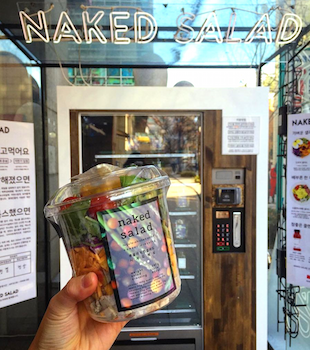
Surviving in a competitive market industry is difficult for first-time entrepreneurs. Regardless of how innovative they are, starting an enterprise and successfully developing it is difficult if one cannot find a competitive advantage.
However, Jang Ji-man and Lee Wun-sung, both graduates of Seoul National University (SNU), found an innovative method for the success of their salad store, Sweet Balance. In the midst of vigorous competition amongst salad franchises due to the diet boom in Korea, Jang and Lee’s success story inspires many future enterprisers.
In 2015, Jang and Lee opened their first salad store, Sweet Balance by the main gate of SNU.
“Sweet Balance first began in the school’s start-up club, Seoul National University Student Venture Network (SNUSV),” Jang stated. “We were divided into teams to effectively use 100,000 won to produce the greatest profits. Wun-sung and I realized that there was no appropriate salad store in our school and decided to create one right away. To our surprise, it was a hit.”
The first-time CEOs found difficulty grasping good quality of vegetables without exceeding the limited budget and effectively approaching customers’ demand.
“We first examined what customers wanted and then evaluated how much it would cost,” Jang said. “We learned the importance of saving for net profit and ingredients for the next day. It took a lot of time, but it turned out to be a valuable lesson for our business in the long-run.”
Jang realized customers sought convenience and speed. Hence, the duo decided to develop the first salad vending machine in Korea, attracting many customers.
The vending machines, named Naked Salad, were installed near gyms for convenience. It also provided in-store menus, the naked salad, meal salad and various fresh juices. Their salads boast well balanced nutrient combinations of protein and calcium with fresh ingredients such as Japanese pumpkin, avocado and chicken.
Only a year after its opening, Sweet Balance produced a profit of five million won per month and nearly four hundred million won a year. Sweet balance extended by launching two more branches and three more salad vending machines each in Guro, Bongcheon-dong and Itaewon.
As an extension to their huge success, they implemented an effective delivery service. Customers could now eat salads literally anywhere.
Jang also emphasized how Sweet Balance tried to develop more unique and diverse menus to differentiate themselves from the rest of the competitive salad franchises. Sweet Balance does not hesitate to use various ingredients including smoked duck, egg omelets, handmade ham, and raw salmon. Before releasing new menus, Jang and Lee objectively judge whether or not customers would really enjoy them.
“I feel a tingle in my heart whenever a customer shows great satisfaction towards our products,” Jang said. “One of the best things of owning an enterprise lies not merely in financial profits, but also in making others happy.”
Jang recalled that the vision of enterprise “high risk, high return” was extremely influencial for him and his business.
“I wanted to start a business, when I heard that you get as much as you put in,” Jang said. “I recommend those who are willing to show 100 percent of their effort to also take a dive.”
Jang aspires for Sweet Balance to rank number one in customer satisfaction by 2018 in the salad franchise industry. He further reassured future enterprisers that they can succeed if they do not fear failure.
“I hope that you start to experience reality of enterprise quickly,” Jang said. “Careful consideration is useless. Don’t be afraid of failure. Learning through failure is the only way you can succeed.”

